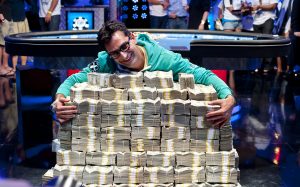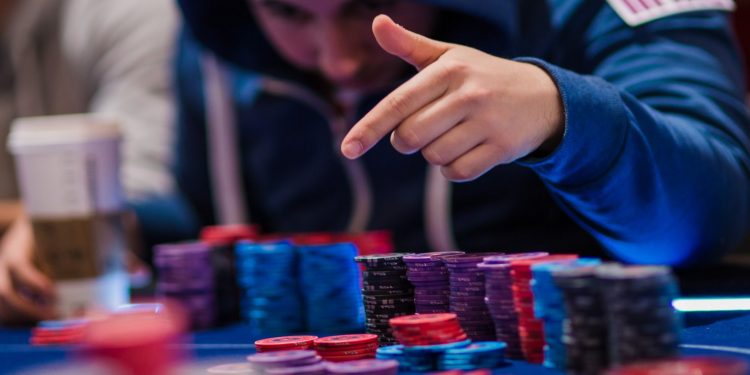In Texas Hold’em the Pot Odds refer to the percentage amount of the pot to the value of an anticipated call. The Pot Odds are linked to the chance of the current poker hand winning with the turn or river card so as to guesstimate the players return on the investment. Implied odds refer to how much you will get paid if you make a call and hit your hand.
The very first time I played poker, I knew the game depended on the odds. Even when I was new and unable to figure out the pot odds, I still understood the correlation between how much was in the pot and my odds for achieving a winning hand. In the beginning, I was certain this concept was both foreboding and complex.
I have since learned from experience it just the flip side of a little more sophisticated think process regarding my rewards and my risks when playing poker games with my opponents. I am making this journal entry to make certain I know what pot odds and implied odds are and how my poker game can benefit in future games and WSOP poker tournaments.
The Definition of Poker Pot Odds and Implied Odds

The odds of the pot when playing poker are the ratio of the size of the pot at the time when compared to the cost for a contemplated call. In order to make an estimate for the expected value of my call, I must compare the pot odds with the probability of having the winning poker hand based on my future card(s).
I understand implied odds are simply the estimate I make for what I believe I will win. This includes all of the money currently in the pot in addition to any more money I know will be placed into the pot through the calls and bets of my opponents on the future wagering rounds. I must always compare my estimate with what my bet is going to cost. I think of this as one of the unofficial poker rules.
You have to admit, this does not sound much like a precise measure. I know this is because it is different from simple math odds. You have to make a guess or an estimate for the implied odds by taking into consideration the future actions my opponents will make.
Remember when I base my bet on implied odds or a call, I am not only wagering on the odds of making the poker hand I want, but on my ability to predict what my opponents will do once my hand has come in. Not only have I found this to be effective, I also believe it is a good poker strategy.
Examples of Poker Pot Odds and Implied Odds
I am going to clarify this concept in my own mind by noting some examples. If I was going for a flush draw and after the flop with two cards left to come, the odds would be against me at 1.86-to-1. I must have a rough idea how much money I will be able to win if I need to call a bet to draw to complete my flush.
Otherwise, I will have no idea if it pays to remain in the hand or not. I am using the example with the odds against me at almost 2-to-1. If the most I could make from the pot was even money, all I could win was what I had already contributed. This means it would not make sense to continue drawing.
In Texas Hold’em Poker, anytime the pot odds are higher than the odds I will be able to make my hand, it makes sense for me to continue to play. If the odds against making my poker hand are higher than the potential rewards, there is no good reason to continue playing. I use a simple methodology in this situation. If the prize I am trying to win is worth more than the cost of remaining in the game, I will continue playing. If my cost to continue playing is more than the amount of the prize, I am going to fold.
I have also learned this equation can be changed by the pot odds. The reason is even if the size of the pot is currently not enough to make taking another card or two worthwhile, this may change once I have calculated the pot. If my calculations lead me to believe the pot is going to grow a lot during the future wagering rounds, I may have to make a completely different decision.
Implied Odds Offer the Best Rewards with Hidden Hands

When I first started using implied odds as a reason to call one of my opponents, I knew the implied odds for certain draws were much better than for others. I think the most obvious is a flush draw. I have found the majority of my opponents will stop for a moment when their opponent has been consistently calling.
This is provided the opponent comes out betting the moment the board is hit with the third suited card. This is because unless my opponent has decided I am bluffing, has figured a smallish flush draw has fairly small odds or if my opponent is extremely loose, any action they may have made has been seriously impacted by the third suited card.
Everything is different when I have a hidden poker hand. This means my hand is a lot more deceptive. My opponents may not have figured out the strength of my hand. They may try to pay me off thinking I have the second best hand. Due to the stealthy nature, a double belly buster straight draw is going to be my best possible implied odds draw.
I am noting an example of this kind of poker hand as a flop of AJ8 while I am holding QT. In this instance, the board is going to appear a little disjointed. You would have eight outs to get my straight. Assume the outs would be four nines and four Kings.
Knowing the odds will be 4-to-1 against me for getting my straight on the turn. I am going to make the pot odds just above 3-to-1 for my example. This means the pot odds are not going to provide me with the right amount to call. Using the same example when I have a hidden hand would make the pot odds favorable. There is another bonus for a Texas Hold’em Poker hand like this. If one of my opponents is holding a hand such as AK, I will have a lot of action if the board is hit with a King. My opponent is never going to realize I have a stealth nut straight about to hit.
The Playing Styles and Betting Structures
I know no-limit and pot-limit poker games offer bigger implied odds than the fixed-limit poker games. This is because bigger wagers have a better potential on the subsequent betting rounds. I have also learned if I do not understand the playing styles used by my opponents, structure by itself becomes meaningless.
I can increase my implied odds against passive opponents because they very rarely raise. This means not only are my draws against them inexpensive, I know once I make my hand I will be paid extremely well.
When I figure the implied odds, I must guard myself against self-deception. Realize there is some subjectivity associated with implied odds. I must never use implied odds to justify a weak call or I am just asking for trouble. I am going to note an example.
Let’s say I check and my opponent has bet $10 with $20 in the pot, with a flush draw on the turn. My immediate odds for calling will be 3-to-1 in addition to whatever implied odds I use for the final round of betting on the river. Unless I have read my opponent incredibly well or he is 100 percent transparent, it will be far too easy to become overly optimistic and self-deceptive regarding the amount of money my opponent may decide to place in the pot if I achieve my poker hand.
If I make my hand on the river, my opponent may check right behind me if I attempt a check raise. If my wager had been for an amount my opponent would most likely have called, I would have won a bigger pot.
This means my check raise failed. I must remember the next time I find myself in the same situation to bet a bigger amount as opposed to attempting a check raise. My hope is my opponent will call because he thinks I am bluffing. He may surprise me and release his hand after thinking it over for a moment. I may have been better off attracting a call more easily with a smaller bet. This may also have been the time to attempt a check raise. This is the beauty of Texas Hold’em Poker, it is an art as opposed to a science.
Predicting the Actions of My Opponents
I am going to back things up a little. I must have at least a general idea what action my opponent will take once I complete my hand before I decide to draw or play on the earlier betting rounds.
If I know my opponent will call any big bets on the river, I am able to take the short price during the turn. This is because I already know once I make my hand, the pot will be bigger than all the times I bluffed or folded the river, did not get there or drew only to find my opponent decided to call and took the pot. If I am playing an opponent who hunkers down every time they see a scare card on the board, I may be better off eschewing the draw. I can always wait until I feel my hand is better before I bet against my opponent for value.
Final Thoughts
Experience has taught me the way implied odds are used by certain players is a quick trip to self-deception in poker tournaments. I have seen a lot of players calling bets for no reason that I was able to determine. A few times, I decided to ask them why. They told me they decided the bet was worthwhile because of the implied odds.
I realize implied odds mean every player must guess to an extent. I also know if the guess is not somewhat accurate, the long term pay off will be extremely poor. Self-deception is a lousy poker strategy. It is just another way of the players convincing themselves they should play instead of folding.
I have enough savvy now to know I should never play one of my hunches when I am playing poker. You must always enforce self-discipline if I want to win the game. Refuse to be one of those players who pretend they are more intelligent than hunch player because of implied odds. They believe any two cards are capable of winning the game and hide their desire for action even if the pot is wrong when the implied odds are considered.
♠ pokerjournal.org
Pot Odds, Implied Odds – FAQ
What are good pot odds?
Any time you put yourself in a +EV situation. It's not always best to call with pot odds because weak hole cards can lead to second best hands.
How are pot odds calculated?
By determining how much you can win based on how much is in the pot. This becomes easier when you play more.
How are implied odds calculated?
By determining how much you can win if your opponent calls and you hit your draw. This can relate to semi-bluffing.
What are reverse implied odds?
How much you expect to lose if you hit your draw and your opponent still has a better hand. Try to stay away from these situations.



















Discussion about this post